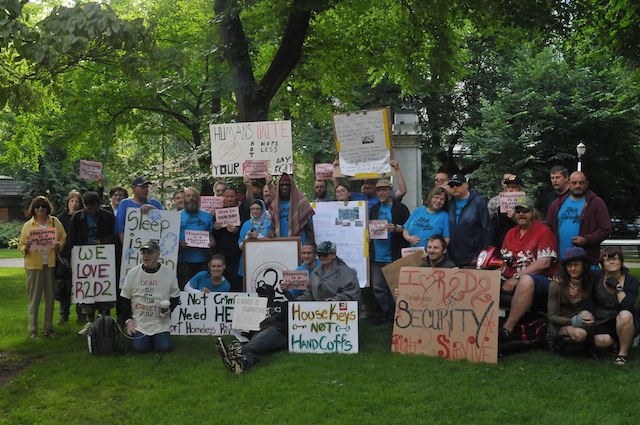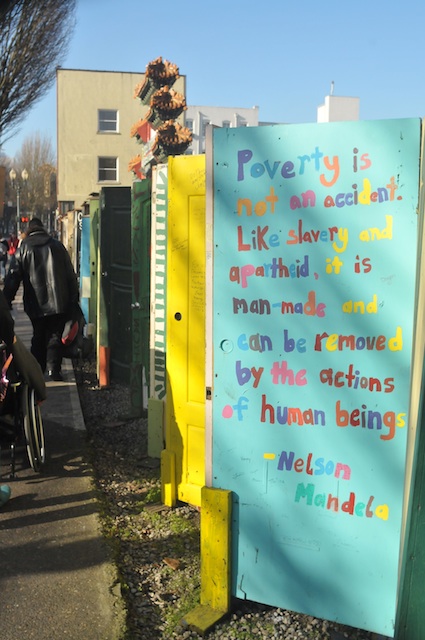The thought of camping conjures images of freedom, romance, and perhaps even daring. Pitch a tent, lie under clear skies, sit in front of an open fire telling stories or picking a guitar. Forage for food that will become dinner. Hike down a trail to a pristine lake and take a dive into brisk water. The chance to escape the stresses of city life and head for the hills is a powerful draw.
The City of Portland, however, has a different take on the idea of camping. It believes that the people without housing who find rest and respite at Right 2 Dream Too (R2DToo) are engaged in the act of camping. It is a cruel use of language, and that cruelty has resulted in the Bureau of Development Services (BDS)–formerly under Commissioner Dan Saltzman and now under Commissioner Amanda Fritz–to declared the people of R2DToo in violation of Oregon Administrative Rules 918-650-0020 and 918-650-0025 regarding the “establishment of a recreation park-campground without obtaining required permits from the City”. (See: http://arcweb.sos.state.or.us/pages/rules/oars_900/oar_918/918_650.html)
Also at play was the city’s “zoning code for construction of a fence greater than six feet in height without the required building permit or historic design review approval.” The fence issue has been handled, but the fines continue for the lack of a recreation park-campground permit. To date, the fines stand at over $25,000. Though technically the fines are levied against property owners Michael Wright, Linda M. Cossette, Daniel L. Cossette, and Donna L. Cossette, they also are clearly aimed at R2DToo.
For the past 21 months R2DToo–on the corner of West Burnside and 4th, adjacent to the Chinatown gate– has provided shelter for over 60 people day and night. It is a place where people find both hope and sanctuary. Since its inception in October 2011, 55 members of R2DToo have found jobs, with 53 of them still employed. Forty-nine Dreamers have secured housing, with 48 of them still maintaining that housing. R2DToo does not cost the city any money, nor have the police ever had cause to intervene in its affairs. By most measures the project is a success.
For the business community, however, R2DToo is a failure. The official language is that it hurts livability and business. Part of that hurt involves David Gold who wishes to turn the Grove Hotel Building just across the street into a youth hostel. Gold also wants to lease the ground floor to a restaurant, but it seems nobody will take the space as long as it looks out over people without housing. Though R2DToo clearly has an undeniably positive effect on many people’s lives, business owners do not appear to hold those lives as valuable as profit.
In December 2012, R2DToo filed a complaint against the city for the fines. R2DToo Attorney Mark Kramer sought a court order stating that R2DToo is not a campground and therefore not subject to code violations and associated penalties and that all fines paid by R2DToo pertaining to the campground violation should be returned. This opened another question: is this a matter for civil court, or should it remain an administrative matter? In more concrete terms, R2DToo was asserting that it is up to a court, not the city, to determine whether R2DToo is a campground.
The complaint was heard by Judge Karin J. Immergut on July 11. Prior to the hearing, the predominant feeling among supporters of R2DToo was that Immergut would side with the city and rule the matter to be outside her jurisdiction. At a county courthouse rally, speakers affirmed that they would keep on fighting regardless of the result. Their determination was reinforced by crowd of over 40 standing with R2DToo in the courtroom gallery.
But a funny thing happened on the way to the bench. Judge Immergut did not reach a decision. She said she needed several weeks before coming to a decision. It was not a clear cut victory–Immergut may come back and dismiss R2DToo’s complaint–which according to Kramer would mean an end to R2DToo as a residence for dozens of unhoused people. Nevertheless, Immergut’s reprieve offered possibility.
Kramer’s real job in representing R2DToo has been to reframe the argument as a moral issue, rather than a point of law. R2DToo is clearly not a campground in any rational or human understanding of the term. R2DToo is the people who find comfort and safety there, and to uproot the site–unlike closing a campground in the Mt. Hood National Forest–is to uproot people who already are very far down on their luck.
The city has said it wants to end homelessness. In fact, 8 years ago the city and Multnomah County loftily declared they would smite homelessness by 2015. Targeting R2DToo fails that goal on two counts. Clearly, R2DToo helps those without housing and it also creates a home–a feeling of community.
In fighting R2DToo, the city and county appear to be looking not for an end to houselessness, but rather an end to the problem of houseless people getting in the way of the business community. The difference is crucial.









2 comments for “R2DToo In Court Fighting for Housing Rights”